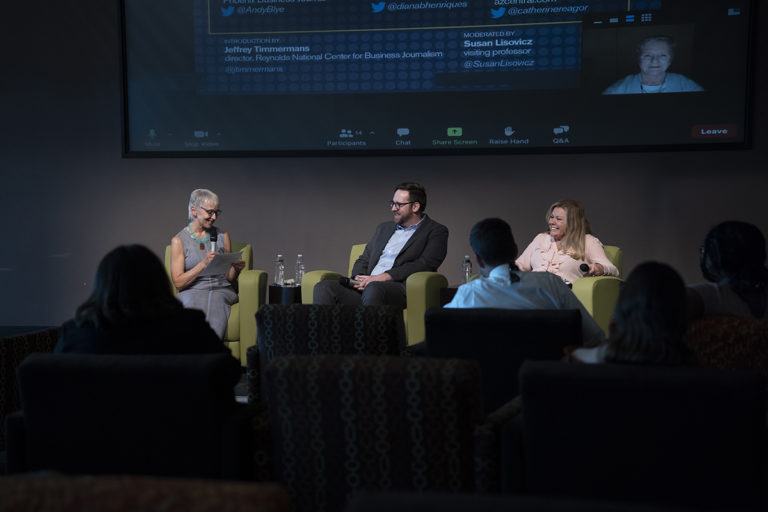On April 4, the Reynolds Center hosted a panel discussion at the Walter Cronkite School of Journalism featuring three professional business journalists offering insight on their careers and what life is like in their field. The panel was introduced by Reynolds Center director Jeffrey Timmermans and moderated by Cronkite Reynolds Foundation visiting professor Susan Lisovicz. Featured on the panel were:
- Andy Blye, technology and finance reporter at the Phoenix Business Journal. Blye received his M.A. in investigative journalism from the Cronkite school in 2020.
- Diana Henriques, contributing writer and former finance reporter at the New York Times. Henriques has written four books, most notably “The Wizard of Lies” about disgraced former stockbroker Bernie Madoff.
- Catherine Reagor, real estate reporter at the Arizona Republic. Reagor, who received her B.A. in journalism from Cronkite in 1990, has been one of the lead figures covering the housing market in Phoenix for over 20 years.
After a moderated discussion with Lisovicz, Cronkite students got the opportunity to ask the panelists some questions directly. Here are some of the highlights and key takeaways from what the three journalists had to say.
Endless curiosity can lead to exciting new angles
One of the biggest ongoing stories in Blye’s beat currently is a new semiconductor plant under construction in northern Phoenix, which will become the first U.S.-located plant for the Taiwan Semiconductor Manufacturing Company. The plant has received coverage from several national outlets, but for Blye and the Phoenix Business Journal, its ongoing impact on the surrounding community is an extremely important local issue. As Blye searched for new stories to tell in his coverage of the plant – which he also happens to live close to – he started examining Phoenix zoning records from the area and talking to nearby small businesses.
He noticed there were a lot of hot air balloons in the area. Blye wondered how those balloons navigated the construction cranes and reached out to some of those local hot air balloon companies. Soon, Blye found himself taking a trip in a balloon, listening as a pilot described how the construction was forcing balloon operators to adjust their landing zones.
“The thing I’ve come to realize about business reporting is that people that read the business section like stories too,” Blye said. “They like the same interesting characters and interesting things that are happening… the hot air balloon company is not as big a deal business-wise but it is [impacted] by the semiconductor plant coming.”
Find ways to glean stories out of records
In 2016, Reagor got a tip that superstar swimmer and 23-time Olympic gold medalist Michael Phelps would be moving to the Phoenix area to train and volunteer coach at Arizona State, where his personal coach Bob Bowman had just taken the head coaching position with the Sun Devils’ swim program. Phelps had also, according to the tipster, recently bought a “gorgeous” home in either Scottsdale or Paradise Valley, both affluent suburbs of Phoenix.
“So I went into the public records and I pulled up every home sale in Scottsdale and Paradise Valley for the past six months,” Reagor said. “I went record by record, LLC by LLC, and on one of the LLCs, the person who was listed on it was [Phelps’s] agent.”
Reagor then dove into the mortgage documents for the property – which contained hundreds of pages – and found an address for a home that Phelps had just sold in Boston, confirming that the Arizona home she had zeroed in on was his. She wrote up a quick story containing images of the home from its real estate listing.
“It got about three million views,” Reagor said.
Familiarize yourself deeply with your beat – and its history
When news came over the wire that a stockbroker named Bernard Madoff had been arrested on securities fraud charges, Henriques seized upon the story before many of her peers fully grasped what was going on. Henriques says that a well-regarded investigative journalist even confessed to her a few days later that he had never even heard of Madoff before the arrest. But Henriques knew instantly that Madoff’s arrest was a story of an extremely high magnitude because she had studied the history of the formation of the Nasdaq index and understood how intimately involved Madoff had been in that process.
“I grabbed the story that night and I never let go of it,” Henriques said. “If I hadn’t had that depth of historical knowledge about the development of the market, I would have missed it… learn what happened in the world of business before you got there because it can have extraordinary benefits.”
In Henriques’ case, those benefits included eventually landing the first interview with Madoff after his arrest–but only because she stayed persistent, writing to him every month and leveraging her decades-long relationships with lawyers in the white-collar defense bar, including with Madoff’s own attorney, who respected her work and her fairness as a reporter. She also knew the Madoff who, before his arrest, had become known behind the scenes as a pioneer in how the modern stock market functions.
Most importantly, though, Henriques stressed that reporters need to find reasons why reporters should talk to them and find common ground with those they are trying to persuade to talk. In Madoff’s case, Henriques was able to convince him that she would tell his story in the most accurate and three-dimensional way possible because she knew what his reputation was prior to his arrest, which Madoff appreciated after other coverage of his arrest and fraud scandal had painted him as a “two-dimensional cartoon villain.”
That interview and the ensuing book Henriques wrote about Madoff, resulted in an HBO movie adaptation that Henriques was not only heavily consulted on but was also cast to play herself in, making her acting debut opposite Robert De Niro as Madoff.
“I absolutely urge you, even if you don’t know numbers, learn history,” Henriques said.
Seek out diverse sources and perspectives
In response to a student question about how journalists should address and cover systemic racism and racial inequities in the business world, Blye and Reagor both stressed that virtually any business beat has those issues and journalists should be obligated to highlight them. Reagor spoke about a current long-term project she is working on examining the lingering effects of redlining in housing insecurity trends and eviction practices within the Phoenix metro area.
“We’ve got to do something about it, to change it,” Reagor said. “So we’re coming at it from that [angle], looking at the data on mortgages, evictions, rents and the problems there. It maddens me that we’re not past some of these things… but I feel more hopeful than I did 20 years ago.”
Henriques, meanwhile, stressed that every journalist must be intentional about broadening and diversifying their base of sources, despite the extra work it will take to do so.
“Reporters tend to know what their sources know,” Henriques said. “And if all of their sources are white guys who went to Yale, you’re just going to know what white guys who went to Yale know. It’s incumbent upon each one of us to work hard at developing as diverse sources as we possibly can… you have to make sure that you are exposing yourself to sources who have much different life experiences than you do.”
Special thanks once again to our three panelists for participating in this event! You can watch the full panel, which contains further insights about the professional world of business journalism, by clicking here.











